|
|
|
Sort Order |
|
|
|
Items / Page
|
|
|
|
|
|
|
| Srl | Item |
| 1 |
ID:
165578
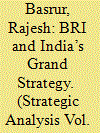

|
|
|
|
|
| Summary/Abstract |
India’s rejection of the BRI for strategic reasons does not mean it is resistant to Chinese investments, which are—to the contrary—both welcome and rapidly increasing. Indian strategy in this respect is in accord with the changing character of the international system, where strategic competition co-exists with economic cooperation as well as competition. In contemporary international politics, structurally driven conflictive behaviour is modified by high levels of strategic and economic interdependence. This incentivises India, like other major powers, to seek optimal gains through economic exchange even as it defends its strategic interests through military means short of war.
|
|
|
|
|
|
|
|
|
|
|
|
|
|
|
|
| 2 |
ID:
119077


|
|
|
|
|
| Publication |
2013.
|
| Summary/Abstract |
As the USA and Russia seek to reduce their nuclear arsenals en route to universal disarmament, they are hamstrung by the lack of a doctrinal basis for minimum deterrence. The cold war debate between Albert Wohlstetter and Patrick Blackett remains valid today. Though Wohlstetter's ideas, which produced large arsenals, remain influential, an examination of the history of nuclear rivalries shows that Blackett's thinking-offering security with more compact arsenals-is closer to reality. The minimalist doctrines and practices of China, India and, to a lesser extent, Pakistan offer useful lessons for the USA and Russia. But the Asian powers themselves need to iron out the inconsistencies in their thinking, which harbours elements of Wohlstetter's thought, if they are to be truly useful models that the bigger powers can emulate.
|
|
|
|
|
|
|
|
|
|
|
|
|
|
|
|
| 3 |
ID:
118556
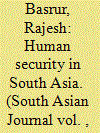

|
|
|
| 4 |
ID:
169194
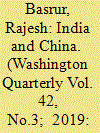

|
|
|
| 5 |
ID:
192608


|
|
|
|
|
| Summary/Abstract |
Indian military strategy has tended to neglect the link between the conventional and nuclear domains in a nuclear weapons environment. We argue that this anomaly is evident in two broad areas: the conception of “war,” and the complexity produced by new technologies that span the two domains. First, we show with empirical evidence that “limited war” in a nuclear environment is misnomer: the reality is more appropriately called “marginal conflict” owing to its extremely restricted nature. It follows that strategic planning and posture must be tailored accordingly. We then highlight the risk of escalation produced by conventional technologies that carry potential cross-domain nuclear effects, noteably with respect to cyber, artificial intelligence, missile defence and space. We note that the complex strategic effects produced also complicate military-strategic interactions traversing geographic domains, noteably South, Southeast Asia, and Northeast Asia. The paper concludes with some reflections on the reasons for these lacunae in Indian strategic thinking and what might be done about them.
|
|
|
|
|
|
|
|
|
|
|
|
|
|
|
|
| 6 |
ID:
170896


|
|
|
|
|
| Summary/Abstract |
Why did India launch and later withdraw from the exercise in coercive diplomacy – Operation Parakram – against Pakistan in response to the attack on India’s Parliament by terrorists based in that country? This paper marshals factors operating at the systemic, state and individual/small-group levels of analysis to show that, despite the paucity of evidence on decisionmaking of the kind required for an effective foreign policy analysis (FPA) approach, a reasonably clear picture can be developed. It combines deductive logic relating to state behavior in a nuclearized environment with the limited empirical evidence available to show that India never intended to go to war and that the operation was essentially a bluff that, having eventually reached a dead end, was called off.
|
|
|
|
|
|
|
|
|
|
|
|
|
|
|
|
| 7 |
ID:
104648
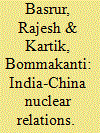

|
|
|
| 8 |
ID:
164693
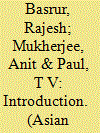

|
|
|
|
|
| Summary/Abstract |
This introduction explains the rationale for this special issue of Asian Security. It begins with a short discussion about the relevance and the utility of the term “security dilemma” in international relations. The concept, which emerged during the Cold War, has since been used extensively to describe India-China relations. This special issue attempts to add to our understanding of the India–China relationship as well as to contribute to enriching the theoretical literature in a number of ways. First, it represents the first detailed effort to present a set of analyses that encompasses theory, history, and the full spectrum of strategic issue areas to explain the dynamics of a key contemporary inter-state relationship involving China and India. Second, the analysis reveals the complexity of security dilemma politics by highlighting how states respond to their predicament in different ways. Third, this special issue draws attention to an area that has been largely neglected in the literature: the relationship between the security dilemma as a concept and domestic politics. Finally, a case can be made that a security dilemma-type response in a situation that does not demand it may actually create a dilemma where none existed before. These and other complexities are abundant in this collection of articles. The chapter concludes by summarizing the main arguments presented by the contributors to this special issue.
|
|
|
|
|
|
|
|
|
|
|
|
|
|
|
|
| 9 |
ID:
109827
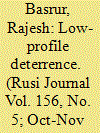

|
|
|
| 10 |
ID:
153831
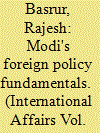

|
|
|
|
|
| Summary/Abstract |
The advent of Narendra Modi as prime minister has produced considerable debate about the direction that Indian foreign policy might take under his stewardship. While there are diverse ways in which one might assess Modi's foreign policy vis-à-vis the major powers, three overarching questions are of central importance. First, given his reputation as a staunch Hindu nationalist, to what extent do his ideological leanings influence Modi's foreign policy, especially with respect to the use of national power? Second, how is Indian policy towards the major powers designed? Are there signs of a classic balance of power approach drawing it towards the US and Japan, and against China? Finally, how is Indian foreign policy configured towards the objective of attaining higher status in the states system? Above all, is Modi significantly different from his predecessors? It is shown that there is no significant shift in the use of power arising from the ‘Hindu’ content in Modi's foreign policy; that his approach to the major powers reflects continuity (with some variations) by way of a focus on strategic partnerships; and that the quest for status is in line with the strategy pursued by previous prime ministers. In sum, there is no substantive change in the trajectory of Indian foreign policy and rising India's future direction is likely to remain both predictable and moderate.
|
|
|
|
|
|
|
|
|
|
|
|
|
|
|
|
|
|
|
|
|